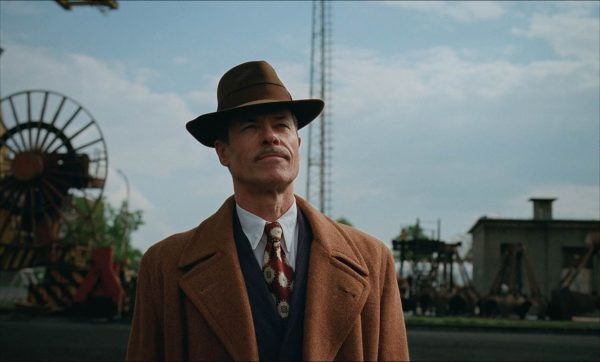The Brutalist, 2024.
Directed by Brady Corbet.
Starring Adrien Brody, Felicity Jones, Guy Pearce, Joe Alwyn, Raffey Cassidy, Stacy Martin, Emma Laird, Isaach de Bankolé, Alessandro Nivola, Benett Vilmányi, Michael Epp, Jonathan Hyde, Peter Polycarpou, Salvatore Sansone, Ariane Labed, and Matt Devere.
SYNOPSIS:
When a visionary architect and his wife flee post-war Europe in 1947 to rebuild their legacy and witness the birth of modern United States, their lives are changed forever by a mysterious, wealthy client.
Brady Corbet, former child actor has shown plenty of promise in his writing and directing career to date starting with 2015’s Childhood of a Leader. It showed plenty of maturity for a debut director with plenty of flourishes and a structure and style that many established filmmakers would struggle to emulate. 2019’s Vox Lux proved more divisive but still had its share of fans, again showing his distinctive approach as a director. His latest film, The Brutalist has earned a rapturous response since premiering at the 2024 Venice Film Festival. A 3 ½ hour epic, it tells the story of the fictitious Hungarian Jewish architect László Tóth (Adrien Brody) and his experience in America between the 1940s and 60s. The title comes from the mid-century style of architecture, popular in post-war Eastern Europe, it could also be applied to some of the film’s events.
One of the main comments around The Brutalist is that it feels like the kind of film Hollywood forgot how to make, with comparisons drawn to other epic immigrant stories like The Godfather and Once Upon a Time In America. These are the highest possible compliments that could be paid to the film but far from a pastiche or copy of New Hollywood, Corbet’s vision of the American dream is fresh showing the opportunities it presents but also the harsh reality that faces many. We see this in Tóth’s journey that sees him living in a store cupboard of his cousin Attila’s store. This is a far cry from the reputable career he had back in Hungary. He goes on to live in charity housing with his friend Gordon and a heroin addict, barely scraping by.

Here, László crosses paths with Harrison Lee Van Buren (Guy Pearce) who could fit the titular brutalist’s description. This relationship sees a shift in fortunes for the architect, who is assigned to construct a huge project on the Van Buren estate, in tribute to his late mother. While on the surface it may seem like his problems have been solved in truth there is so much to unpack with moral ambiguity and Corbet keeping us at a distance the second act in some ways deconstructing the work of the first, going in directions that are unexpected but rewarding.
The performances help the film soar with Brody, no stranger to awards from his role in The Pianist in a rare leading role at this stage in his career. He excels at showing László’s unease at his new surroundings, never feeling settled in his new career and country despite his eventual success. Guy Pearce gives one of his strongest performances as a slimy, manipulative donor, who we initially think of as something of a saviour but there is much lurking beneath his façade. Felicity Jones’ Erzsébet, comes into play more in the second half but is a standout showing a different side to some of her other performances.
Daniel Blumberg’s score finds a balance between orthodox and uncomfortable, wonderfully complimenting the shifting tone of the film and its kaleidoscopic visuals. He has tough shoes to slip into with the late great Scott Walker scoring Corbet’s previous films, yet Blumberg is a natural delivering a score for the ages, poetic yet chaotic in equal measure.
The Brutalist should be an example for Hollywood on how to make films for a lower budget. Its visual impact was made all the more impressive by the fact the budget was under $10 million and the film’s Pennsylvania locations were shot in Hungary. This is a film that took Corbet seven years to make and shot on 35 mm and VistaVision, it’s clear this is a painstaking labour of love.

Lol Crawley’s cinematography is hypnotic, from the opening shots of the immigrant boat arriving in New York and an inverted, almost terrifying glimpse of The Statue of Liberty, to the epilogue taking place in the 1980s. There are so many images that defy logic and make this a monumental visual piece of work that lingers long in the memory.
While there has been some controversy surrounding AI usage in some of the accents, that should not take away the many resounding achievements of The Brutalist. It feels like a lost film from years gone by yet timely with its commentary on the pros and cons of the American Dream and immigrant experience. The intermission makes it more digestible than some other three hour plus epics like Babylon or The Irishman (not to diminish the strengths of those films). Whether it wins the top prizes at the Oscars or not, this is a film that will leave a lasting impact and should reframe the way Hollywood approaches budgets and location filmmaking. It is a picture that defies its description and structure to be totally unique and firmly establishes Corbet as a generational filmmaker.
Flickering Myth Rating – Film: ★ ★ ★ ★ ★ / Movie: ★ ★ ★ ★ ★
Chris Connor














